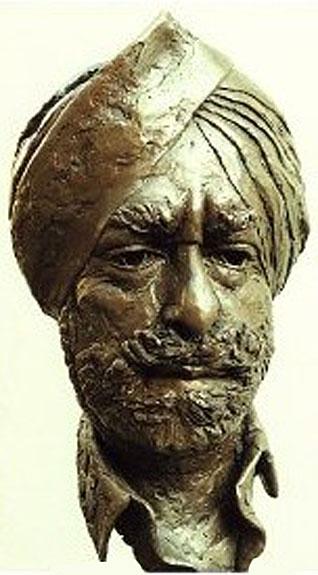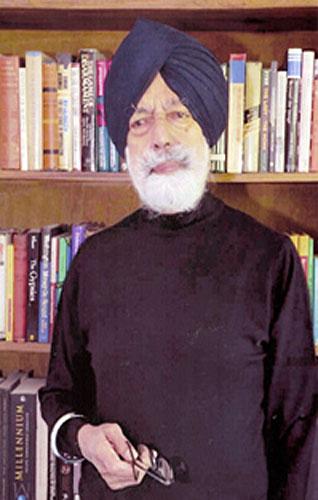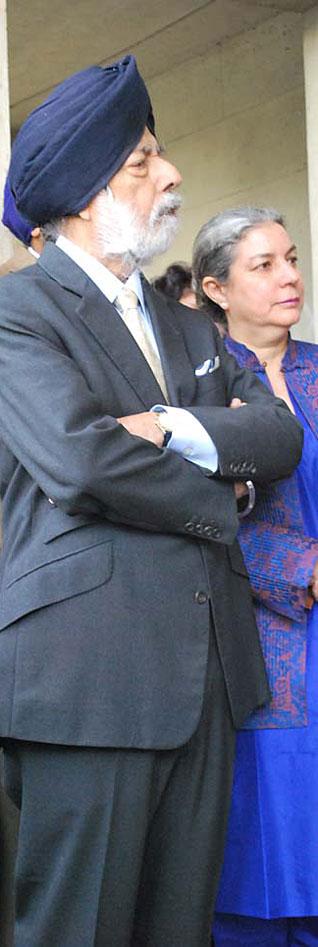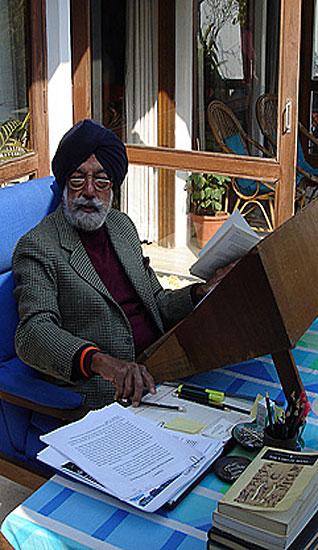Our Heroes
Patwant Singh: An Ambassador For All Seasons
by HARINDER SINGH
Such people suffer neither hunger nor sorrow,
Nor can they ever be termed poor.
Such people are not subject to sadness,
Nor are their limits known.
Such people are not subject to any other one,
For they nourish hundreds, nay, thousands.
Such people sit on carpets,
They can base and debase others.
Such people enjoy the pleasures of the world,
Wearing a shield of safety, they are safe even amongst enemies.
Such people are meaningful,
Favoured by Guru Amardas.
[GGS:1394]
To live in style and benevolence, to speak and listen attentively, to carry an attitude of defiance - it is for a life lived steeped in these values that I salute our famous ambassador, Patwant Singh [March 28, 1925 - August 8, 2009].
Why do I call him an ambassador? Because when I read the aforesaid savayya (verse of praise) in the Guru Granth Sahib, I found Patwant (literally, honorable) Singh meets every standard.
I met Patwant Singh on American soil for the first time when he came to the Midwest in 1995 to do a book signing for his memoir, Of Dreams and Demons (1994). His niece, Rekha Basu, a correspondent for The Des Moines Register, had arranged the event at a local Border's bookstore. My uncle, Dr. Kirpal Singh, who was a prime factor in turning me into a reader, took my cousin Ravpreet Singh (Vismad Design & PanjabMall) and I to the event.
I remember Patwant Singh's demeanor was very impressive: regal and majestic. This was my first impression of the man which is still vivid for me.
One fine late afternoon in the winter of 1998, Karamjit Kaur and I entered 11 Amrita Shergill Marg to seek advice on a human development program FATEH organization had started. The house was atypical of the South Delhi bourgeois "humble abodes." Simple, yet elegant, artsy and full of life - the house hummed with character.
Upon being led into the library-ish room by his secretary, we were greeted by Patwant Singh with a "Sat Sri Akal." We responded with Waheguru ji ka Khalsa, Waheguru ji ki Fateh".
At that, he paused for a second, then said, "You are right, I have been using the wrong salutation, a war cry actually, all my life."
We became more comfortable with each other after many conversations, and some time later he asked me about the most readily available book of his, The Sikhs. I shared my impressions with him candidly. I loved the way the thesis of Sikhi was presented in it: Sikhs are here to create an egalitarian society, which means confronting the domination of Brahmanism. The raison-d'être for Sikhs is to champion ignored and under-represented causes and people; for example, the legal apartheid of South Asia whose victims remain the Dalits (untouchables;
though mulnivasi - "the original inhabitants" - is the preferred term as Dr. Manisha Bangar recently conveyed to me).
I also conveyed to him that the book had several trivial mistakes from Sikh tradition and historical angle, comments which he gracefully acknowledged. No doubt though, he definitely got the big picture right!
Another incident I recall which epitomized his character, took place at the Imperial Hotel in Delhi. It was January 13, 1999, when Justice Kuldip Singh, Former Judge of the Supreme Court of India, gave the Chillianwala Memorial Lecture of that year, speaking on the Criminalisation of Governance and Public Life in India.
After the Justice had finished, Kanwar Sandhu (whose career spans India Today, The Tribune, The Indian Express and the Hindustan Times, and is currently managing a TV channel) asked an unrelated, sensational question about "terrorists" in Punjab.
Patwant Singh, who was chairing the session, grabbed the mike and lectured (actually, scolded) Sandhu on misusing the word "terrorists" instead of "freedom fighters," and cited the lack of professionalism and ethics among the media outlets in India. He cited Yassar Arafat and Nelson Mandela as case studies when the media dropped the "terrorist" label, and found a Nobel Peace Prize winner instead.
During another memorable visit, Patwant Singh shared an amusing anecdote over tea. He had been asked to address an audience at a prestigious Delhi club (you can guess where the remnants of the post British Raj Indian bureaucrats congregate).
A few days prior to the talk, the club's president had called Patwant Singh to acknowledge that he had been coerced to invite K.P.S. Gill, a notorious former Director General of Punjab Police. To this revelation, Patwant Singh responded, "My doctor has advised me to not go near pollution, it is bad for my health."
According to Meher -
Patwant's wife - despite the gentle rebuke, it was with all seriousness that Patwant refused to be on the same platform as K.P.S. Gill - a man who, in Patwant's words, "made his disdain for
humanitarian principles clear."
Public record of more examples of his fearlessness can be found in the Asian Age (January 31, 2000) headlined "State Terror that Executed Punjab."
Patwant Singh wrote there, in reference to K.P.S. Gill: "During his four years in office from November 19, 1991 till December 31, 1995, the State of Punjab, which once reveled in the joie de vivre of its people, became a fetid place - dark and brooding like the man who seemed bent on casting it in his own image."
Patwant questioned the "Indian state for lionising such men whose hands are awash with the blood of thousands of their innocent countrymen."
In those few sentences, it should be clear that Patwant Singh was a man who could stand anywhere in India, in any forum, and speak with vigor and courage. His was a rare personality among scores of Sikhs who remain submissive and overly cautious as they continue to try to appear "Indian-enough" to be left alone by the State.
At a gathering in 2005, Patwant Singh put his hand on my shoulder and offered to introduce me to Sardar Manmohan Singh. To his surprise, I politely refused. Looking askance, I revealed to him that I appreciated the financial genius of the man who The Economist had called "another Adam Smith" for bringing India out of License Raj. However, I could not appreciate his blanket lie at the 1993 Vienna conference where he said "... being Sikh, [I] find no abuses of Human Rights of Sikhs, much less any minorities in India."
Please. Go ask Soli Sorabjee, former Attorney General of India and Special Rapporteur to the UN's Human Rights Commission. He will set the record straight. And for a comprehensive, credible documentation, visit Ensaaf's website.
Patwant Singh wasn't aware of Manmohan Singh's grossly inaccurate statement, and understood why I didn't need to shake the Prime Minister's hand.
One afternoon, while discussing heritage issues, Patwant Singh pointed me to the Indian Express of the
day, saying, "See this - there is only one IAS officer (Indian Administrative Services, the bureaucracy which runs India) in the whole of Punjab who is honest - that is why the Punjabi political leadership put him [Gurnihal Singh Pirzada] in jail. Otherwise, who can touch the bureaucrats, let alone put them in jail?"
Incidentally, Lord Meghnand Desai recently commented: "The British invented bureaucracy for India, the Indians perfected it."
Today, the expression of dissent in India comes with severe repercussions. But that doesn't mean that Patwant Singh has ever stopped championing those few who stood up!
The filmmakers of The Widow Colony, Harpreet Kaur and Manmeet Singh, and I met with Patwant Singh to invite his leadership at the documentary's November 2005 premier in India.
Despite his deteriorating health, Patwant Singh spoke defiantly about the conspiracy of silence surrounding the 1984 pogroms. While chairing the post-screening panel, he forcefully discounted the notion of "we should forget about it" and cautioned against the dire consequences of judicial failure.
Afterwards, along with advocate Harvinder Singh Phoolka (champion of 1984 survivors, encouraged heavily by Patwant Singh), Patwant Singh and I initiated educational programs for the pogrom survivors through the Gyan Sewa Trust.
And that wasn't the only outreach he had initiated. In 1977, he established the Kabliji Hospital and Rural Health Center in Haryana after witnessing pregnant young women stuck on a roadside; ironically, this hospital was burned down by a Hindu mob in 1984, but it was rebuilt again.
The last time I spent time with Patwant Singh was at his house. My friend Davinder Singh and I had gone to seek his advice on Panjab Digital Library's efforts to locate and digitize everything related to the Panjab region. At the time, Patwant Singh was co-authoring a biography on Maharaja Ranjit Singh with Jyoti M. Rai (numismatist & historian).
He jokingly shared that Satjiv Singh Chahil (like a son to Patwant Singh and a "wiz" at Apple, Palm & Hewlett Packard) had bribed him with a Mercedes, but he couldn't even take it for a spin on Delhi roads. He had to keep the Benz parked under a tree, under a cloth, to protect it from dirt and hidden from people.
"What a cover-up!" he laughed.
A few days later, I returned with a list of some rare books on Ranjit Singh which might augment his research, and he gifted me a signed, out-of-print, copy of his earlier book, The Golden Temple.
This trans-national Sikh ambassador excelled in multiple dimensions: as an author, designer, activist, philanthropist and conservationist. After The Fatal Miscalculation (his editorial debut on 1984 and Punjab issues), his focus in life and writing shifted primarily to the Sikhs and their faith. He had already become widely known for introducing and running Design - a revolutionary
magazine covering architecture, urban planning, visual arts, graphics, and industrial design.
Upon discovering that the real problems of India lie in its politicians, government procedures and corruption, he began work on a series of articles and books meant to affect public opinion and official policies. Those included India and the Future of Asia (1967) and The Struggle for Power in Asia (1971). Post-1984, Patwant's passion exploded in his efforts to present Sikhs as sovereigns, to counter the Indian propaganda machine bent upon maligning Sikhs.
The Golden Temple (1989), Gurdwaras in India and Around the World (1992), The Sikhs (1999), Garland Around My Neck (2001), and Empire of the Sikhs - The Life and Times of Maharaja Ranjit Singh (2008), were the fruits of decades of labor on this front. He also published The World According to Washington: An Asian View (2005) and The Second Partition: Fault-lines in Indian Democracy (2007).
How did he do all this while maintaining his aristocratic lifestyle, especially after his 1984 transformation? How did he manage to write extensively for newspapers and magazines (The New York Times, The Globe and Mail, The Independent, The Asian Age), work in the Sikh art world with Susan Stronge (Victoria and Alberta Museum's curator) and Inni Kaur (impetus behind I See No Stranger exhibition at the Reuben Museum, New York), run non-profits, and still make time for conservation of anything Sikh or Punjab related?
He did it through pure strength of vision and commitment. And of course, because Meher (literally, grace) was at his side through the later years as his partner-in-crime. She brought infinite charm and dignity to Patwant Singh, in addition to keeping him in great health, until the man completed his earthly journey at the age of 84.
This is how a Sikh transcends transmigration, here and now.
Last month, I was at the "1469" shop in New Delhi - what a place for all things Punjabi! The shop's owners Kirandeep Kaur and Harinder Singh were my conduits to Patwant Singh for the last decade. "1469" is planning a sale of commemorative paraphernalia as a tribute to Patwant Singh's inspiration and encouragement in preserving our heritage. I very much look forward to the unveiling.
I often quote Patwant Singh's words from The Golden Temple: "It took the industry, passion, perseverance
and sacrifices of whole generations to build, adorn and defend it."
In keeping these words vital and alive, I hope that all Sikhs will hear and understand them at a deeper level. Industry, passion, perseverance, sacrifice - and of course, a few ambassadors like Patwant Singh! - will be what helps the Sikh Quom (commonwealth) to re-discover its raison-d'être!
[The author works for the Sikh Research Institute and the Panjab Digital Library. His focus is on education as a fulcrum for social change.]
Translation of verse from Guru Granth Sahib adapted from English translation by Dr. Darshan Singh.
March 26, 2011
Conversation about this article
1: Daljit Singh (London, United Kingdom), March 26, 2011, 10:08 AM.
Bhai Sahib was an ambassador for the Sikhs and he had a good grasp of our history and customs, beliefs and traditions. This is what The Sunday Times had to say about this incredible personality: "Patwant Singh was a campaigner, a writer and a philanthropist whose publications embraced history, religion, politics and world affairs. His later work focused on the position of Sikhs, and Sikh faith, in Indian society and challenged orthodoxies about the nature of western relations with Asia. The 1984 attack on the Golden Temple at Amritsar, an event that indirectly led to the assassination of Indira Gandhi, the Indian Prime Minister, proved a turning point which enraged Singh and led to him being regarded as one of the most admired, and committed, commentators on Sikh affairs. As well as writing influential books, Singh applied his talents to other mediums including television, and as a radio commentator and magazine editor. His articles were published in India, US, Canada and the UK. The first of Singh's books appeared in 1967 and was called 'India and the Future of Asia.' It had the 1962 Sino-Indian War and the Second Kashmir War in 1965 as a backdrop. 'The Struggle for Power in Asia,' published four years later, sought to adjust Western perceptions about the sub-continent. It was after 1984 that he began to delve into Sikh issues. He wrote significant parts of the 1985 volume, 'Panjab: The Fatal Miscalculation,' and became an outspoken critic of the Indian Army's assault on the Sikhs' holiest shrine, Darbar Sahib, showing characteristic bravery in his forthright condemnation of those who colluded in the atrocities. Yet, Patwant Singh offered a Sikh perspective on many important issues and served as a beacon of light for Sikhs who recognised the need for a clear and strong voice on behalf of the community. He was aggrieved at the erosion of Sikh values within those institutions which were meant to safeguard and promote the interests of the community. In 'Garland Around My Neck: The Story of Puran Singh of Pingalwara,' co-written with Harinder Kaur Sekhon, he paid tribute to a remarkable humanitarian. After decades spent caring personally for increasing numbers of people who were unable to take care of themselves, Puran Singh, in 1957, founded Pingalwara, an institution which cares for the disabled, the poor, the mentally handicapped and those with terminal illnesses. A constant critic of errant political leaders, Sikh and non-Sikh alike, his resolute and uncompromising views on the need for transparency and social responsibility became legendary. Many public figures fell foul of his incisive comments: but most vied with one another for an audience with him in order to discuss their divergent views. Even his critics would show a deferential respect of his erudite position on topics ranging from architecture, conservation, the environment, predatory capitalism, human rights, and female foeticide. In 1989 he wrote 'Golden Temple' followed by 'Of Dreams and Demons,' a personal memoir that chronicled the developing history of India between the 1930s and the 1990s. In 1999, on the 300th anniversary of the foundation of the Sikh Khalsa movement, Singh produced 'The Sikhs.' Published by John Murray, it is widely regarded as one of his most accomplished works. His 'Empire of the Sikhs' focused on the reign of Maharajah Ranjit Singh and served as an important source for those who sought authoritative accounts of Sikh history. In 'The World According to Washington: An Asian View,' published in 2005, the author examined the often violent history of relations between western imperial powers and Asia. His perspective is passionately critical of Western intervention and the precedence he suggested was given to their political and economic interests over the concerns of Asians. Singh wrote about Europeans who, he believed, 'considered the domination of Asia their birthright.' He went on to discuss how the deployment of troops and U.S.-made arms, and coercive development plans, was altering history. He also discussed his fear that the Western world view of Asia was skewed by the interventions. 'The World According to Washington' was conceived as a work that would redress the balance and present alternative views about U.S. involvement and interests in countries such as Indonesia, Korea, Vietnam, Laos and Cambodia, as well as India and Pakistan, and Iran. Born in Delhi in 1925, Singh was educated in the capital and began his career in the family business of construction and engineering. He discovered a natural ability to write at an early age and launched his first periodical, the 'Indian Builder,' in 1953. By 1957, he had unveiled a journal called 'Design,' which rapidly won influence as a publication which brought together the latest thinking in the fields of architecture, urban planning, visual arts, graphics and industrial design. They were subjects that, up to that point, tended to have isolated audiences that rarely mixed. Architecture and art remained important to Singh even as he embraced an overtly political agenda. A man of substance who was also a charmer, he was a mesmerising speaker. Crisply dressed with a handsomely tied beard and stylish turban, he left a deep impression on whoever he came in contact with. Such was Singh's reputation that on an occasion a lady who inquired if it would be appropriate to kiss Singh goodbye after a group visit, she was informed that to kiss Patwant is to have kissed the entire Sikh nation. Writing skills aside, Singh was also responsible for establishing the Kabliji Hospital and the Rural Health Centre, near Gurgaon. In 1973, when Singh was in the Aravalli Hills in Haryana to purchase some land, he was flagged down by a small group of people by the side of the road. A young woman was experiencing complications in labour and beyond the level of expertise of her midwife, so her family was trying to get her to a hospital in the nearest town. Patwant Singh immediately resolved to build a hospital there. When Singh suffered a heart attack in 1977, his appreciation for the quality of the medical care he received led him to strengthen his resolve to build the rural hospital. Shortly before his death the veteran Sikh campaigner was in London to unveil a memorial to the last Queen of the Punjab, Maharani Jind Kaur, at the Dissenter's Chapel at Kensal Green. His wife, Meher Dilshaw, and an adopted son survive him. Patwant Singh, writer and Sikh campaigner, was born on March 28, 1925. He died on August 8, 2009, aged 84." It was my earnest desire for Bhai Sahib to write a preface for my book, 'The Sikhs of Today,' but unfortunately he left for his heavenly abode. I should waste no time and see whether Khushwant Singh will do this for me.
2: Gurjender Singh (Maryland, U.S.A.), March 26, 2011, 10:21 AM.
Nice tribute to Patwant Singh ji. I could not forget the Patwant Singh wording in "Widow Colony" film made on the widow of the 1984 anti-Sikh pogroms of Delhi. He said Sikhs have so much money that instead of begging for 20 years, if these Sikhs want they can bring those suffering widows out of poverty in a week. But it is our shame that those Sikhs are merely after their own fame and power.
3: Inni Kaur (Fairfield, CT, U.S.A.), March 26, 2011, 11:40 AM.
What a wonderful tribute! I too have many wonderful stories about him. The one word that comes to mind when I think about Patwant Singh is 'Regal'. What style he had! What courage! He had a presence that compelled everyone to straighten up around him. I would relentlessly tease him about this. He indulged me. Meher, ever so graceful, would laugh at our banter. To dine at 11 Amrita Shergill Marg was a treat for the senses. A table laid with exquisite china and crystal, his eclectic art collection, the selection of books and the sizzling conversation made dining with him an experience to remember. One never knew who would turn up for the cocktail hour and Patwant, being Patwant, never minced his words. I MISS your wit, courage and calling it as you see it.
4: I.J. Singh (New York, U.S.A.), March 26, 2011, 4:22 PM.
My contacts with Patwant date from pre-1984 days. We met on one of his trips to the States; he was trying to develop support for his Kabliji Hospital then. Our acquaintance solidified into a friendship of mutual appreciation when he and Harji Malik jointly compiled one of the first books, "The Fatal Miscalculation", on the Indian army's attack on the Harmandar at Amritsar, and related events. In the political climate of those days, no major publisher in India would touch the book and it had to be privately published. I got hold of it and reviewed it, and that was the start of a wonderful friendship. Every summer he came to the States and it became our yearly routine to enjoy a leisurely dinner to which I would invite a few young Sikh men and women - some even hot-headed - to engage in spirited discussions on India, Punjab, Sikhs, Khalistan; no topic was taboo. I reviewed five of his books and he reviewed all four of mine very kindly. The events of the 90's were traumatic beyond belief but they sure awakened and deepened his interest in Sikhi and we are all the beneficiaries of his passion.
5: Kirpal Singh (Daytona Beach, Florida, U.S.A.), March 27, 2011, 12:47 AM.
Excellent tribute to a brilliant thinker, writer, planner ... and a courageous human being.
6: Plate (U.S.A.), March 28, 2011, 3:33 AM.
I bought and read his book, "The Sikhs"; it is well written. I plan to buy his other books in the near future. An excellent tribute to a thoughtful writer and speaker.
7: Balwant Singh (Jakarta, Indonesia), April 21, 2011, 6:45 PM.
I feel more proud to be a Sikh after reading the article. I feel reinforced in the bit of seva I am doing here in Indonesia: www:gurudwaragurunanak.org






